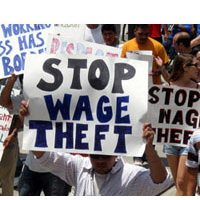Ripped off Low-Paid Workers Are Also Cheated out of Legal Judgments

Low-wage workers are disadvantaged by far more than just low wages. A study in 2008 found that 26% of them nationally were paid less than the minimum wage and 76% of those who worked more than 40 hours a week weren’t paid legally required overtime. Two-thirds of them experienced a pay-related violation in the previous week and they lost, on average, $2,634 a year from these injustices.
Now a study (pdf) by the National Employment Law Project and the UCLA Labor Center shows that low-wage California workers don’t fare much better when they seek redress from the government for the abuse.
Only 17% of workers who complained to the California Division of Labor Standards Enforcement (DLSE) about being rooked by their employer and won actually collected any money between 2008-2011. Workers were able to collect just $42 million of the $282 million DLSE said they were owed.
Employers either disappeared, hid assets or shut down their companies (often reopening as a new entity) to avoid paying what they owe, according to the study, “Hollow Victories: The Crisis in Collecting Unpaid Wages for California’s Workers.”
In 60% of cases where the DLSE awarded judgments to the employee for unpaid wages, businesses were found to be “non-active,” and 24% of the time they reached that status before the agency had a chance to issue its ruling.
Businesses that play catch-as-catch-can are often successful at avoiding paying penalties to the state for their behavior. The DLSE, also known as the Labor Commissioner’s Office, assessed $39.8 million in fines against employers for unpaid wages and other labor violations in 2010-11, but managed to collect only 20% of the money. The state also loses money from tax revenues it would collect if employees were paid what they were owed.
The study lists and explains five tools that are available to workers for collecting money owed them, then explains why the tools won’t work. Pre-judgment attachments, post-judgment liens, a mechanic’s lien, collection agencies and collection by the DLSE all look good on paper, but are ineffective.
A piece of legislation that might help, Assembly Bill 1164, is opposed by the Chamber of Commerce for being a “jobs killer” and is bogged down in an Assembly committee. The bill would allow workers who haven’t been paid what they are owed to file a lien against the employer’s property (except, in most cases, a residence).
The Los Angeles Times quoted the legislation’s author, Assemblywoman Bonnie Lowenthal, as implying that it is likely dead for this session.
–Ken Broder
To Learn More:
Many Low-Wage Workers Who Won Judgments Were Never Paid (by Marc Lifsher, Los Angeles Times)
Assembly Bill 1164 (California Legislative Information)
Hollow Victories: The Crisis in Collecting Unpaid Wages for California’s Workers (by Eunice Hyunhye Cho, Tia Koonse and Anthony Mischel, National Employment Law Project and UCLA Labor Center) (pdf)
- Top Stories
- Controversies
- Where is the Money Going?
- California and the Nation
- Appointments and Resignations
- Unusual News
- Latest News
- California Forbids U.S. Immigration Agents from Pretending to be Police
- California Lawmakers Urged to Strip “Self-Dealing” Tax Board of Its Duties
- Big Oil’s Grip on California
- Santa Cruz Police See Homeland Security Betrayal in Use of Gang Roundup as Cover for Immigration Raid
- Oil Companies Face Deadline to Stop Polluting California Groundwater





